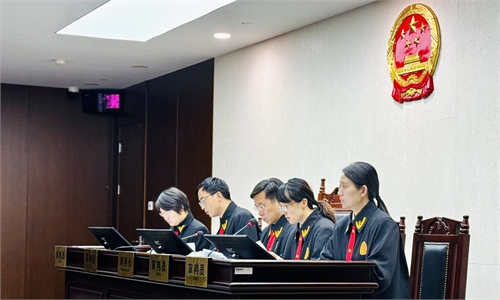
A camera Photo: VCG
In a labor right lawsuit, China's Supreme People's Court gave the final verdict that a company's decision to terminate the contract with a female employee was lawful, rejecting the employee's demand for compensation after the employee was dismissed for serious disciplinary violation.
The case, which took place in 2019, made headlines across Chinese media recently. According to media reports on Tuesday, on June 24, 2019, the company in Shenzhen, South China's Guangdong Province, installed a number of high-definition cameras in the work area, one of which was located above the employee surnamed Wang's office cubicle.
Considering that the company's senior executives were male, Wang feared that the camera could capture her in vulnerable ways and make it easy for a wardrobe malfunction, so she shielded the camera with two umbrellas.
The company's head manager verbally communicated with Wang on the issue twice, and sent a warning letter to Wang twice in writing. But Wang insisted on holding the umbrellas at the cubicle for more than 10 working days.
The company claimed that, from June 24 to July 17, 2019, Wang deliberately covered her cubicle with two umbrellas in order to escape the daily management of the company, so that the company could not know whether she was working or playing mobile games at work, or engaged in other activities unrelated to work.
The company stated that Wang's behavior had a serious negative impact on other employees, disrupts the normal office environment, and violates office disciplines and code of conduct that an employee should abide by.
On July 17, 2019, the company decided to terminate its contract with Wang on the grounds that Wang was seriously violating company rules.
Wang disagreed, alleging that the cameras in other directions can still capture her cubicle, her behavior did not affect the realization of the company's management, and there is no serious violation of discipline or violation of company rules. Wang argued that the company's termination of their contract was illegal, asking the company to pay a total of 335,124 yuan ($46,213) in compensation.
The court of first instance rejected Wang's claim for compensation, which Wang appealed. Later, the court of second instance found that Wang's behavior was a serious violation of the company's labor disciplines. The termination of the labor contract between the company and Wang is legitimate, the court said.
Wang refused to accept the verdict of the second instance, and applied to the China's Supreme People's Court for a final verdict.
Following a thorough review, the supreme court said that although the labor law clearly protect the interests of employees, employees are obligated to abide by the company's labor disciplines. As a middle-level manager at the company, Wang's behavior not only affected the normal working order of the company, but also caused negative impact on other employees, the court ruled. It upheld the ruling by the lower courts.
Global Times

